|
|
|
36
Introduction
Muhammad
Ali Jinnah (1875-1948):
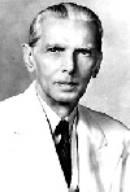 Father
of the Nation Quaid-i-Azam Mohammad Ali Jinnah's achievement as the founder of
Pakistan, dominates everything else he did in his long & crowded public life
spanning some 73 years. Yet, by any standard, his was an eventful life, his
personality multidimensional & his achievements in other fields were many,
if not equally great. Indeed, several were the roles he had played with
distinction: at one time or another, he was one of the greatest legal luminaries
India had produced during the first half of the century, an `ambassador of
Hindu-Muslim unity, a great constitutionalist, a distinguished parliamentarian,
a top-notch politician, an indefatigable freedom-fighter, a dynamic Muslim
leader, a political strategist &, above all one of the great nation-builders
of modern times.
Father
of the Nation Quaid-i-Azam Mohammad Ali Jinnah's achievement as the founder of
Pakistan, dominates everything else he did in his long & crowded public life
spanning some 73 years. Yet, by any standard, his was an eventful life, his
personality multidimensional & his achievements in other fields were many,
if not equally great. Indeed, several were the roles he had played with
distinction: at one time or another, he was one of the greatest legal luminaries
India had produced during the first half of the century, an `ambassador of
Hindu-Muslim unity, a great constitutionalist, a distinguished parliamentarian,
a top-notch politician, an indefatigable freedom-fighter, a dynamic Muslim
leader, a political strategist &, above all one of the great nation-builders
of modern times.
For over thirty years, he had guided their affairs; he had given
expression, coherence & direction to their legitimate aspirations &
cherished dreams; he had formulated these into concrete demands; &, above
all, he had striven all the while to get them conceded by both the ruling
British & the numerous Hindus the dominant segment of India's population.
Moreover, for over thirty years he had fought, relentlessly & inexorably,
for the inherent rights of the Muslims for an honorable existence in the
subcontinent. Indeed, his life story constitutes, as it were, the story of the
rebirth of the Muslims of the subcontinent & their spectacular rise to
nationhood, phoenix like.
After
pushing for the establishment of a separate Muslim state, Mohammed Ali Jinnah
became Pakistan’s first head of state. Jinnah was born on
December 25, in
1875 in Karachi
in a prominent mercantile family in Karachi.
He came from a family of Gujarati Khoja Muslims. His father was a small
businessman, but he managed to go to England to study. One of eight children, he
was educated in the Sindh Madrassah & the Christian Missionary High School,
Karachi. At the age of 17, he went to England & studied law at Lincoln’s
Inn, London
from 1892 to 1896.
He returned to India in 1896 & started a law practice in Bombay (now
Mumbai), as the only Muslim barrister practicing there but
then part of British-ruled India.
Starting out in the legal profession with nothing to fall back upon except his
native ability & determination, young Jinnah rose to prominence & became
Bombay's most successful lawyer, as few did, within a few years
he established a law practice but soon left to devote his time to politics.
37
Introduction
Turning to politics, Jinnah joined the Indian National Congress in 1906,
& in 1910, already a highly regarded Congress member; he was elected to the
Indian Legislative Council in Delhi.
. He went to England in that year along with Gopal Krishna Gokhale
(1866-1915), as a member of a Congress delegation to plead the cause of Indian
self-government during the British elections. A year later, he served as
Secretary to Dadabhai Noaroji (1825-1917), the then Indian National Congress
President, which was considered a great honor for a budding politician.
Mr. Montagu (1879-1924), Secretary of State for India, at the close of
the First World War, considered Jinnah
"perfect
mannered, impressive-looking, armed to the teeth with dialectics..."
Jinnah,
he felt,
"Is
a very clever man, & it is, of course, an outrage that such a man should
have no chance of running the affairs of his own country."
Here, at the Calcutta Congress session (December 1906), he also made his
first political speech in support of the resolution on self-government. Because
of his conviction that Muslims & Hindus could work together for the
independence of India, he remained aloof from the All-India Muslim League until
1913
He only joined the Muslim League in 1913, becoming its president for the first
time in 1916
president when he felt assured of its intent to cooperate with the Indian
National Congress, the Hindu political party.
That year marked the highpoint of his efforts to establish
a common Congress-Muslim League platform.
Gokhale, the foremost Hindu leader before Gandhi, had once said of him,
"He
has the true stuff in him & that freedom from all sectarian prejudice which
will make him the best ambassador of Hindu-Muslim Unity”
&,
to be sure, he did become the architect of Hindu-Muslim Unity: he was
responsible for the Congress-League Pact of 1916, known popularly as Lucknow
Pact- the only pact ever signed between the two political organizations, the
Congress & the All-India Muslim League, representing, as they did, the two
major communities in the subcontinent. The Congress-League
38
Introduction
scheme
embodied in this pact was to become the basis for the Montagu-Chemlsford
Reforms, also known as the Act of 1919. In retrospect, the Lucknow Pact
represented a milestone in the evolution of Indian politics. For one thing, it
conceded Muslims the right to separate electorate, reservation of seats in the
legislatures & weightage in representation both at the Center & at the
minority provinces. Thus, their retention was ensured in the next phase of
reforms. For another, it represented a tacit recognition of the All-India Muslim
League as the representative organization of the Muslims, thus strengthening the
trend towards Muslim individuality in Indian politics. & to Jinnah goes the
credit for all this. Thus, by 1917, Jinnah came to be recognized between both
Hindus & Muslims as one of India's most outstanding political leaders. Not
only was he prominent in the Congress & the Imperial Legislative Council, he
was also the President of the All-India Muslim & that of the Bombay Branch
of the Home Rule League. More important, because of his key-role in the
Congress-League entente at Lucknow, he was hailed as the ambassador, as well as
the embodiment, of Hindu-Muslim unity.
Muslim League was originally organized to protect Muslim rights in India,
a predominantly Hindu country. Although at first he continued to work for
coalition, he soon came to believe in the need to create a separate Muslim
state, & worked hard to increase support for the Muslim League.
Jinnah’s
shift in position became apparent in 1920, when he withdrew from the Indian
National Congress. Jinnah
resigned from Congress in 1920 when he became disillusioned with the violence
& communal passions associated with the non-cooperation campaigns of
Mohandas Gandhi,
despite Gandhi’s own staunch advocacy of non-violence. Relations
between the Hindu majority & Muslim minority deteriorated rapidly in the
late 1930s, Jinnah
was still committed to settling Hindu-Muslim differences, but the divisions
widened in 1928 when the Nehru Report rejected his 14-point constitutional
compromise proposal. In vain did Jinnah argue at the National convention (1928):
"What we want is that Hindus & Mussalmans should march together until our object is achieved...These two communities have got to be reconciled & united & made to feel that their interests are common".
The Convention's blank refusal to accept Muslim demands represented the
most devastating setback to Jinnah's life-long efforts to bring about
Hindu-Muslim unity, it meant
39
Introduction
"The
last straw"
for
the Muslims, &
"The
parting of the ways"
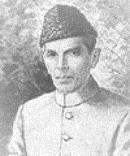 for
him, as he confessed to a Parsee friend at that time.
Frustrated, Jinnah moved to London in 1930, & remained there until he was
persuaded to return home to help his people in 1935 when
elected permanent President of the Muslim League however; he attended three
round-table conferences (1930-1932) in London.
for
him, as he confessed to a Parsee friend at that time.
Frustrated, Jinnah moved to London in 1930, & remained there until he was
persuaded to return home to help his people in 1935 when
elected permanent President of the Muslim League however; he attended three
round-table conferences (1930-1932) in London.
The League lost heavily in the provincial elections of 1937, while
Congress, led by Gandhi & Jawaharlal Nehru, won a majority in 7 of the 11
provinces. Congress’s refusal to form coalition governments with the Muslim
League, particularly in the United Provinces, proved to be the final
Hindu-Muslim break. From 1940 onwards, Jinnah propounded the demand for a
separate Muslim state, which had been raised in the Lahore Resolution of that
year.
The formulation of the Muslim demand for Pakistan in 1940 had a
tremendous impact on the nature & course of Indian politics. On the one
hand, it shattered forever the Hindu dreams of a pseudo-Indian, in fact, Hindu
empire on British exit from India: on the other, it heralded an era of Islamic
renaissance & creativity in which the Indian Muslims were to be active
participants. The Hindu reaction was quick, bitter, & malicious.
Mr. Jinnah also exerted an unquestioned moral authority over the fractious
politics of the Muslim League. Simultaneously, he deployed his legal skills in
the complex constitutional negotiations with the British & Congress.
Jinnah’s claim to be the sole speaker for Muslim India at the Simla Conference
of July 1945 was recognized unquestioningly, greatly strengthening the demand
for a state of Pakistan. Nevertheless, Jinnah accepted the British Cabinet plan
of 1946, which envisaged regional autonomy for Muslims within a territorially
united India. The breakdown of this proposal resulted in communal riots that
threatened civil war. The partition of the Indian subcontinent was finally
agreed on June 3, 1947. Pakistan emerged as a state physically divided into two
unconnected halves, one of which later split off to become Bangladesh
in 1971.
40
Introduction
On August 15, 1947, Mr. Jinnah addressed a country a few hours old over
the radio from Lahore:
"The creation of the new state has placed a tremendous responsibility on the citizens of Pakistan. It gives them an opportunity to demonstrate to the world how a nation containing many elements can live in peace & amity & work for the betterment of all its citizens irrespective of caste or creed. Our object should be peace within, & peace without. We want to live peacefully & maintain cordial friendly relations with our immediate neighbors & with the world at large."
Jinnah attempted to declare Pakistan a secular state, but died, in 1948,
without achieving this final goal.
His death in Karachi on September 11, 1948, robbed Pakistan of its leading
political figure.
A man such as Jinnah, who had fought for the inherent rights of his
people all through his life & who had taken up the somewhat unconventional
& the largely misinterpreted cause of Pakistan, was bound to generate
violent opposition & excite implacable hostility & was likely to be
largely misunderstood.
Such
was Quaid-i-Azam Mohammad Ali Jinnah, the man & his mission, such the range
of his accomplishments & achievements.
Pakistan:
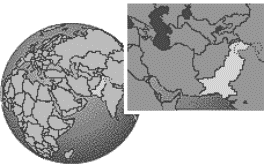 The Indus Valley civilization flourished in Pakistan.
Officially Islamic Republic of Pakistan, republic in south Asia, bordered on the
north & north-west by Afghanistan, on the north-east by Jammu & Kashmir,
on the east & south-east by India, on the south by the Arabian Sea, & on
the west by Iran.
In about 2300 BC.
Aryan invaders occupied the area in 1500 BC
& developed the Hindu religion. The region was subsequently conquered by
Persians, Indo-Greeks, & Kushans.
The Indus Valley civilization flourished in Pakistan.
Officially Islamic Republic of Pakistan, republic in south Asia, bordered on the
north & north-west by Afghanistan, on the north-east by Jammu & Kashmir,
on the east & south-east by India, on the south by the Arabian Sea, & on
the west by Iran.
In about 2300 BC.
Aryan invaders occupied the area in 1500 BC
& developed the Hindu religion. The region was subsequently conquered by
Persians, Indo-Greeks, & Kushans.
41
Introduction
Arabs
conquered territory in the northwest in the AD
700s & brought the religion of Islam. From the 1200s northern India was
ruled by the Muslim Delhi Sultanate, which was conquered by the Moguls, also
Muslim, in 1526.
The
area of Pakistan is 796,095 sq km (307,293 sq mi), excluding the section of
Jammu & Kashmir under its control. The capital of Pakistan is Islamabad;
Karachi
is the largest city.
It is in the northern hemisphere at a longitude between 23 deg E & 38 deg E.
The total area is 891,940 sq. km including the Northern areas which make up
approximately 88,000 sq. km. The border with Afghanistan is the Durrand Line
which is 2,240 km long. The Indo-Pakistan border is 1,600 km.
A
weak for of tropical monsoon climate occurs over much of the country, with arid
conditions in the north & west, where the wet season is only from December
to March. Elsewhere, rain comes mainly in the summer. Summer temperatures are
high everywhere, except in the Northern Pakistan, but the winters can be cold in
the mountainous north.
Quick
view of History of Pakistan:
Bounded
on three sides by the land mass of the sub-continent, Pakistan defends a
thousand kilometre long coastline running from Iran, at the mount of the Dasht
River in the West, to the Indian border on the edge of Sir Creek in the east -
made up of rocky headlands, pocket bays, lagoons & wide alluvial plains
which thrust inland, in some instances as deep as 130 kilometres.
The
first European attempts at comquest of this wealthy & colourful land was
perhaps that of Alexander the Great, who advanced to the mouth of the Indus in
326 BC. He used the Khyber Pass as his springboard of the march from Persia
& Afghan & down the Indus where his fleet waited to sail to the
Euphrates.
Originally, in its western form, India's name derived from the Persians
& the Greeks - from the fertile breadbasket watered by the great river of
civilization, the Indus. When the two sovereign nations of the sub-continent -
India & Pakistan - were born in the partition of 1947, it was perhaps
paradoxical that the Indus basin represented the heartland not of India but of
Pakistan.
Islam burst upon the
42
Introduction
world
in the 7th century. In under a century it roared across the desert & the
Middle East, & westwards along the coasts of Eastern & northern Africa
& into Spain & France. About the year AD 711 it surged across the
Arabian Sea from Basra & the Persian Gulf & ascended the Indus. What is
now Sind, the 'land of the Indus', was invaded by a Muslim army led by Muhammad
Bin Qassim.
From the first loud echoes of protest against British rule at the
beginning of the century, through all the long years before 1947, the Muslim
minority held fast to their dream of freedom from religious persecution.
When a timetable for partition was finally decided, it was announced that
India & Pakistan would have operational control of their own armed forces by
the date of partition - 14th August 1947 - & a committee was established to
carry out the division. It didn't go well. The training establishments &
combat units of the old Indian Army, the Royal Indian Navy, & the Royal
Indian Air Force were scattered throughout the sub-continent . Many units, with
large Muslim population, were in the areas that were to remain in India; most
defence production facilities were in India, as were the bulk of the military
stores.
From the outset, Pakistan's Armed Forces were undermanned. Because of the
disparity in size, Pakistan received fewer stores, supplies & facilities,
& most of those allocated were never delivered. On paper, atleast, Pakistan
received six armoured battalions of India's twelve; twelve artillery regiments
to twenty five; & thirty to thirty-five infantry regiments to seventy to
seventy-five.
The
immediate requirement for the planned army of 150,000 men was approximately
4,000 officers, of whom only 2,500 were available. The difference was made up by
temporary commissions, short service officers & the employment of about 500
British officers. The last were important: there was only one Pakistani
Major-General, two brigadiers & fifty three colonels. At its birth, Pakistan
was defended by a paper army only.
In
the next fourty years its Muslim men would fight valiantly & successfully in
ardent defence of their new found homeland against the most overwhelming odds.
These ill-equipped, undermanned, untrained Armed Forces had one weapon, supreme
when all else failed, a weapon forged & tempered in
43
Introduction
the
last thousand years. It was a weapon cast from pure faith. It was called
courage.
Uniqueness
of Pakistan:
There
are around 200 countries in this world & there are different factors, which
worked in the creation of those countries & nations. As the working factors
behind the creation of countries like
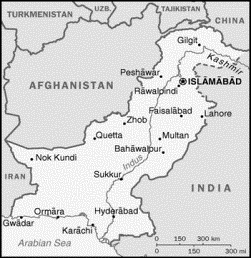 o
Britain
was color,
o
Britain
was color,
o
Israel
& East Timor was religion,
o
Bangladesh
was economy,
o
India,
Australia & South Africa was geographical basis or land,
o
Germany
was race or creed &
o
Bangladesh
& Afghanistan was language.
However, the Islamic Republic of Pakistan is the only country in the
entire world, which took its birth on the base of ideology in the very sacred
month & to be accurate, the night of 27th of Ramzan. & this
ideology was none other than the divine code of Islam as presented &
completed by Allah (S W T) in the form of the Holy Quran & as practically
demonstrated by the Prophet Hazrat Muhammad (S A W).
This
day have I perfected your Din (religion) for you & completed My Nemat
(Favor) unto you, & have chosen for you as religion Al-Islam…
(Al
Maeda 5:3)
This verse from the Quran focuses on two facts: Din or religion &
Nemat or favor/blessing. Din implies the Objective Truth: Islam while Nemat
implies the height of human mankind & crux (climax) of enlightenment:
Prophet Hazrat Muhammad (S A W).
44
Introduction
Islam:
(DIN) way to live, a complete code of life not just a religion:
In order to comprehend the ideological basis of Pakistan we must have a clear understanding as to what is Islam. The term Islam is derived from the root Silm that signifies peace - peace with Allah as well as with all the creatures. Technically speaking, Islam means,
"Full
submission to the Will of Almighty God In all walks of Life".
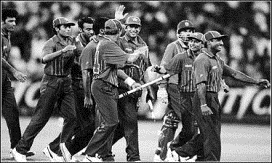 Every
Muslim must confess & affirm the fact that there is none worthy of worship
& obedience except Allah, & that Prophet Hazrat Muhammad (S A W)
is his Messenger. Along with the confession of this basic kalimah, a
Muslim has to declare his faith in the angles, in all the prophets, in the
revealed scriptures, in the Day of Judgment, & in taqdir (predestination).
Every
Muslim must confess & affirm the fact that there is none worthy of worship
& obedience except Allah, & that Prophet Hazrat Muhammad (S A W)
is his Messenger. Along with the confession of this basic kalimah, a
Muslim has to declare his faith in the angles, in all the prophets, in the
revealed scriptures, in the Day of Judgment, & in taqdir (predestination).
One must never overlook the fact the Islam is not a religion; it in fact is a complete code of life that covers every dimension of human life. Islam, in simple, is Sharing,
o In politics: It is sharing of decisions & powers. The leader is required to posses certain physical, psychological/moral & social/ philosophical qualities. He should be sound mind & body; he should also demonstrate justice, dedication, courage, knowledge, & competence in his role as the administrator of communal affairs.
o
In
economics: it is sharing of profit & loss,
o
In
religion: It is sharing the common belief in Tauheed. I.e., one Allah (S W T) as
the sole Master & Prophet (S A W) as the Messenger of the Master &
similarly. Belief in Allah is the core of all Islamic teachings. It means that
Allah is the most exalted one having no partner at all. He alone & none else
is worthy of worship & devotion. He is eternal. He is not subordinate to or
dependent on any one else. He neither has given birth to anyone nor has been
born of someone. He has no consort nor anyone is equal to Him. He is unique
& there is nothing like Him. He is all-powerful having command over
everything. He has full knowledge of all things & nothing is hidden from His
knowledge. He is the sole Creator of the whole universal system & takes care
of each & every entity in
45
Introduction
the
universe. He is the only Lord, Giver of life, Nourisher & Sustainer of all
the things. He neither sleeps nor dozes & is never tired of controlling the
affairs of the world. All of His qualities are eternal & none of them shall
ever diminish. Whatever good or bad happens in this world has ever been in His
knowledge long before its happening & He lets it happen according to His
knowledge. This is called taqdir (destiny or predestination) & there are
mysteries in the creation of evils, which no one can comprehend.
o
In
society: It is sharing the bond of equality, i.e., Musawat & Akhuwat- that
implies that all mankind are equal with no discrimination of caste, color,
creed, or religion. In fact, everybody is a brother to the other & only the
pious & steadfast are superior in front of the Lord.
Pakistan came on the basis of the ideal of practicing Islam in
today’s’ modern era. Yet, many mistakenly limit Pakistan’s universal bases
by terming it a theocratic or religious state whereas on the eve of independence
i.e. in his inaugural address to the Constituent Assembly of Pakistan on August
11, 1947, father of the nation, Quaid-e-Azam Muhammad Ali Jinnah had
categorically stated:
You are free, you r free to go to your temples & you are free to go to your mosques or to any other place of worship in this State of Pakistan, You may belong to any religion or caste or creed that has nothing to do with the business of the state. We are starting with the fundamental principle that we are all citizens & equal citizens of one state.
Hindus & Muslims lived in the Sub-Continent for centuries but they
were like
“Oil
mixed with water”.
They lived together yet apart. Even the Mughal King Akbar’s efforts to
unify both Muslims & Hindus as a single nation had miserably failed rather
backfired. It is also noteworthy that India has always been divided into
“Hindu India” & “Muslim India”. There are clear evidences, which
incline us to believe that Pakistan was not the result of another independence
or freedom movement but it has a unique Divine Basis, unprecedented in the
history of today’s postmodern world.
There are also few other minor reasons for the uniqueness of Pakistan as the people of Pakistan are Muslims & they have love for
46
Introduction
their Allah more than other Muslim countries. They are more involved in religious activities & they are proud of it.
1.
Rehmatal Alamien (S A W): the favor at Ta’aif:
In 619 A.D., after the insolent behavior of people of Ta’aif, when Prophet Hazrat Muhammad (S A W) decided to leave, they began to abuse & stone him. At last, he took refuge in a vine orchard; at that very moment the Angel Gabriel appeared & asked him ‘O Messenger of Allah, if you allow, I can put down these mountains to ruin & eliminate these nonbelievers.’ But quite the contrary (opposite to tradition), the Prophet (S A W) refused & prayed for them, replying that even in their coming generations if there has to be single believer from Ta’aif. He (S A W) shall never want them to be destroyed. Then the birth of Muhammad Bin Qasim (the man who divided) in the descendants to Ta’aif, who put the first brick of partition in the land of Hindustan, was absolutely phenomenal (extraordinary).
Thus, it is but an eternal (infinite) favor, a unique Rehmat of the Prophet Hazrat Muhammad (S A W) that brought Islam to the sub-continent. The Quaid identified the same when he quoted that
Pakistan
had come into being the day when the first Musalman had stepped on the
sub-continent soil…
He definitely meant to say Muhammad Bin Qasim entering the arena in A.D. 712 to establish the first Islamic State in the sub-continent.
2.
Mahmood Ghaznavi, the fall of Somnath & Mr. Jinnah:
Sultan Mahmood Ghaznavi, known as the “Idol-Breaker”, invaded the sub-continent no less than 17 times after AD 1001. In these invasions, he destroyed 300 idols & the big temple of Somnath in the South Kathiawar in AD 1025. In this way, he successfully destroyed a major center of Hindu power, wealth, & more importantly chopped off the Brahman elite that enjoyed total monopoly in the society. The authoritarian clergy & military (Brahmans & Khashtriyas) exploited the masses (Vaiysh & Shudras) to the extent that poor were treated as bad as animals if not worse.
This breakup of the exploitative Brahman monopoly allowed the standard bearers of love & humanity, the Sufies & Mystics (Who give Allah the top priority & have ILM) to enter the sub-continent &
47
Introduction
spread Islam. Islamic behavior influenced the local people very much. These Saints & Mystics acted as saviors for the masses against the cruel elite; they brought about a revolutionary change in the oppressed lives of local people who voluntarily & willingly entered the fold of Islam in lacs.
Mr. Jinnah’s ancestors based in Kathiawar were one of them. It is unprecedented the Mahmood Ghaznavi wages jehad against the idol worshippers & goes on to destroy the Hindu Center where even the local public could dare not enter. The Beneficent & the Most Merciful had blessed the people to recognize HIM (S W T) & become believers.
As it turned out to be, the whole stage was set to send in another blessing in the form of our
“Man
of Determination.”
Muhammad Ali Jinnah to lead the downtrodden Muslims into an independent sovereign state of their own (from that very state which was once center of Brahmans). It surely & only has a divine perspective; if we recognize & follow.
4.
Aulander-e-Asia Dr. Muhammad Iqbal & his Quaid:
Iqbal’s ancestors were not Muslims, they were Brahmans, but later they accepted Islam. The birth of Iqbal in that religious family made him sage, the philosopher, & the poet of Islam & “Spiritual Founder of Pakistan”. It was the Iqbal, who selected Jinnah as the sword, as the leader for the Muslims of the Sub-continent. As he wrote to Jinnah:
“You
are the only Muslim in India today to whom the community has a right to look up
for safe guidance through the storm which is coming”
Iqbal & Jinnah were by no means ordinary people & nor was their relationship just a formal affair. Both their personalities as well as their relationship were pure, sacred, & divine; Iqbal was a man of knowledge. He had equal command in no less than seven languages. He knew Arabic & Persian so he could comprehend the message in Quran & Hadith (S A W) in addition to knowledge of the golden period of scientific developments by Muslims. He had adequate command in English & German languages so he was aware of the modern developments in super powers of those times (in Europe). Similarly, his understanding of Kashmiri, Urdu & Punjabi strengthened his ties with his country & his doctorate in Philosophy introduced him to the history of human thought in all different times of history. Most importantly, his
48
Introduction
spiritual link & studentship of the famous Sufi Hazrat Ali Bin Usman Al Hajver (Data Sahib: R A) & Maulana Rumi was most significant in developing his thoughts & vision. This enlightened him with selfless & pure mystical perceptions of life which, unlike the superficial standing of the religious clergy of his times, focused so strongly on just one reality; i.e. the ultimate truth that Allah is the sole creator & all actions & deeds must aim at winning the will of Allah (S W T).
Thus, resultantly Iqbal progressed to the highest levels of devotion & love for the Lord (S W T) & his unprecedented affection towards the Prophet Hazrat Muhammad (S A W) transformed him into a blessed visionary. He could not only see through millenniums but also recommend accurate solutions to the challenges that lied ahead. In this context in his Allahbad Address in 1930, he became the first Muslim League leader to present the idea of a separate state for the Muslims of north & northwestern sub-continent. Not only that he went to the extent that he considered it the destiny of the Muslims of the area.
As if he was informed in advance & was directed to do so, he chose Mr. Jinnah to execute the idea of an independent Islamic state. He attended the 1931 & 1932 Round Table Conferences in London & met Mr. Jinnah to convince him to comeback & lead the scattered Muslims. His link with Mr. Jinnah developed in to a passion for a joint cause that could take them to the establishment of Pakistan, which was to be the first step towards renaissance of a renewed Muslim Ummah.
Mr. Jinnah ultimately returned in 1934 to lead the Muslims & when a friend asked him that what convinced him to return. He mentioned that different factors were involved; Iqbal & Liaquat Ali Khan were two obvious reasons yet the decisive one was different. Mr. Jinnah narrated to his friend that one night while he was asleep in his London flat something shook his bed. He thought it might be an earthquake so rushed out but saw everybody silent & calm. He returned in his room to find a sacred presence with an unprecedented fragrance in the air. Mr. Jinnah asked with the greatest of respects
“May I have the honor Sir?”
& the personality replied
“
Muhammad (S A W).”
Later the Prophet (S A W) designated Mr. Jinnah to go to the sub-continent, as the Muslims required him as their leader. The Rehmat (S A W) had again put the direction right. With this blessed conviction Mr. Jinnah was then never to look back & like a competent & extra-ordinary barrister as he was recognized all over, he fought his case with
49
Introduction
utmost devotion, dedication & determination. There was no question of a compromise. His cause became his mission, his passion, & his life. In 1937, when Mr. Gandhi & Nehru visited Iqbal on his death, they tried to talk lose about Jinnah. A half-conscious Iqbal did not wait & intervened,
“Excuse
me! I am just a mere sepoy (soldier) & Mr. Jinnah is my commander.”
Both guests were stunned & left in shame. The incident may look insignificant yet it establishes the fact that Iqbal & Jinnah had a spiritual relationship which was based on none other than their sacred love & greatest affection for the Prophet (S A W) is amazing that a philosopher, a Sufi & a visionary like Iqbal who presented the idea of Pakistan & convinced Mr. Jinnah to return has no doubt that Mr. Jinnah is the designated soul to perform the sacred task of founding the biggest Islamic state of the modern world. Yes, Mr. Jinnah was perhaps on an even higher pedestal; where the Prophet (S A W) himself appointed & blessed him for the most unprecedented task in human history & a true Mard-e-Momin like Iqbal could see that in advance.
All these evidences or facts are enough to believe that Pakistan, the land of pure has a Divine Basis & is a result of the eternal favor & mercy, the Prayer & Rehmat of the Rehmatal Alamien Prophet Hazrat Muhammad (S A W), the ultimate object of all creation. In addition, it is the reason Iqbal identifies the significance of Pakistan & directs all of us.
Thus, it is compulsory for us to acknowledge the eternal Rehmat & reciprocate it with concrete actions in accordance with the principles of Islam as demonstrated through the Sunnah of the Prophet Hazrat Muhammad (S A W). If God forbid we falter the generations old, process of elimination shall befall on us. But if we recognize & follow, acknowledge & deliver, love & remain steadfast to submit in front of thy LORD (S W T), the ultimate victory shall always be ours. & until now, the people who changed their way from just & justice have been eliminated from Pakistan.